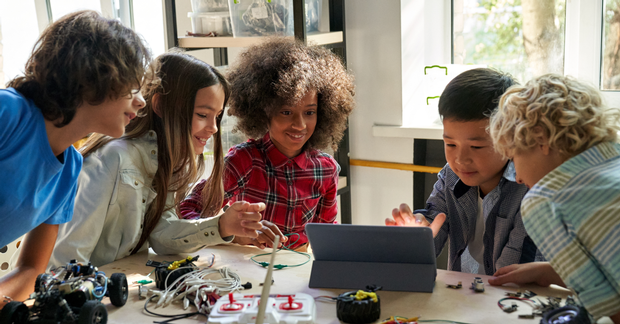Personality Type and Social Emotional Learning: Social Awareness (SEL Series – Part 6)
Yvonne Nelson-Reid is a master practitioner for the Myers-Briggs Type Indicator® (MBTI®) instrument and a practitioner for the Murphy-Meisgeier Type Indicator for Children® (MMTIC®) assessment, who has been helping individuals, families, and children understand themselves better for over 25 years. In the sixth article of this series, Yvonne integrates her years of experience as an educator with her expertise in personality type to explore connections between type and Social Emotional Learning (SEL). New to Type? Click here!
In part one of this series, Personality Type and Social Emotional Learning (SEL), I explained SEL as defined by the Collaborative of Academic, Social, and Emotional Learning (CASEL) organization. Furthermore, I suggested that SEL teaches an awareness of what we need to know for healthy development and learning personality type teaches how individuals go about doing so based on their natural styles. They go hand in hand. Personality type aligns with and strengthens SEL.
How does learning about personality type support the five core competencies of SEL? In parts two, three, four, and five of this series, I demonstrated the connection between type and the SEL competencies of Self-Awareness, Self-Management, Responsible Decision-Making, and Relationship Skills, respectively. Now, in this final article of the six-part series, I turn to the last core competency of SEL, Social Awareness.
Social Awareness
CASEL defines Social Awareness as: "The abilities to understand the perspectives of and empathize with others, including those from diverse backgrounds, cultures, and contexts. This includes the capacities to feel compassion for others, understand broader historical and social norms for behavior in different settings, and recognize family, school, and community resources and supports."1
The Murphy-Meisgeier Type Indicator for Children (MMTIC) assessment designed to help young people identify their personality type, offering a multitude of applications, is one such resource and support. As many of you know, type understanding didn't begin with the MMTIC. It was built upon the foundation of psychological type theory developed by Dr. Carl G. Jung which was later expanded upon and made accessible to all people through the great work of Isabel Briggs Myers and her development of the well-known Myers-Briggs Type Indicator instrument.
For context, some background is imperative here. Jung recognized a universality among people, regardless of age, gender, or race, in how we use our minds. He noted that there were patterns in how people took in information (perception) and how they made decisions (judgment) and the different ways we approach these mental processes often led to misunderstandings and miscommunication. Recognizing that there are no better or worse ways of using our minds, just different, Myers noted that each of us have strengths, what she called gifts, and she made it her life's work to help people identify and enjoy these gifts. Although type theory suggests these gifts are innate, we are not always aware of them.
Both Jung and Myers acknowledged and described the developmental nature of personality type. We all have a predisposition to develop along certain typological lines, but our environment has an impact on this development. Hence, the value in learning about personality type at a young age is to help children discover their own gifts, which brings us back to the work of Dr. Elizabeth Murphy and Dr. Charles Meisgeier. Understanding type differences makes way for the constructive use of these differences, a main tenet of Myers' work which not only applies to adults, but young people, too. Learning type at a young age imprints the young mind with a basic, elemental understanding that people are different, and these differences are valuable. This basic understanding is then easily applied in more sophisticated learning as a child matures which can instill greater compassion and empathy for others, as promoted through SEL and Social Awareness.
Understanding perspectives based upon diverse backgrounds, cultures, and contexts, as the SEL competency of Social Awareness advocates for, is supported through an understanding of personality type. Personality type works the same around the world; it is universal. Research shows that type distribution is similar across cultures and countries. In other words, the percentages of people who prefer Extraversion and Introversion are similar whether you live in the US, the UK, or Asia, for example. This data supports the theory that personality type is inborn. However, we do not develop in a vacuum. Culture, family, and environment can and does influence how our type looks to others. A child with an Extraversion preference in the US may appear to show "more" Extraversion than a child with an Extraversion preference in Japan, for example. This does not mean that one has more Extraversion than the other, it just highlights how our upbringing and diverse backgrounds influence how we express our type. Culture must be taken into consideration as part of type awareness.
Peter Briggs Myers, Isabel's son, wrote a profound statement in the preface of his mother's iconic book, Gifts Differing, in 1995. He hypothesized that "if" personality type is a universal concept then understanding, respect, and an acceptance of differences could cross multiple barriers, political, economic, and between people from different nations, cultures, and races.2 What better way to carry forward Isabel Myers' dream of helping people to appreciate their own gifts and the gifts of others, than through our work with young people. Differences often drive us apart; appreciation for differences can unite us.
Personality type theory supports this core competency, Social Awareness, of SEL through an awareness that type works the same around the world, that every type is valuable in and of itself though it may have different meanings or expressions in various cultures. What a gift we can offer to young people, the gift of self-awareness and through constructive use of type differences, the gift of understanding and appreciating through compassion and empathy, the gifts of others.
My intent with this six-part series was to highlight the connection between personality type and the five core competencies of SEL. I have no doubt that teaching type alongside an SEL curriculum will broaden perspectives, affirm, and support differences, and encourage constructive use of differences, while celebrating our uniqueness and interconnectedness as human beings. Both SEL and type awareness support personal growth and healthy development in all people, but when taught to young people this learning has an indispensable impact on their lives today and into the future.
1."What Is Social and Emotional Learning?" What Is SEL? | CASEL District Resource Center, https://drc.casel.org/what-is-sel/.
2. Myers, Isabel Briggs, and Peter B. Myers. Gifts Differing: Understanding Personality Type. Mountain View, CA: Consulting Psychologists Press, 1995.



_thumb.png)















